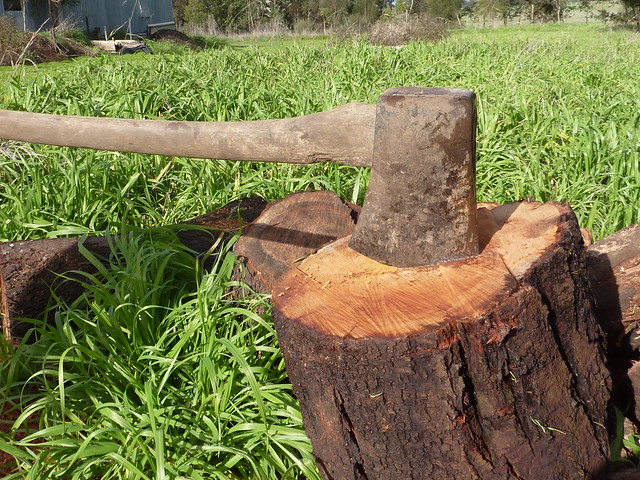In this post we’re looking at the words for axe and related things in Celtic languages.
Words marked with a * are reconstructions.
| Proto-Celtic | *tāxslo- = axe |
|---|---|
| Old Irish (Goídelc) | tál = adze |
| Middle Irish (Gaoidhleag) | tál = adze |
| Irish (Gaeilge) | tál [t̪ˠɑːlˠ/t̪ˠæːlˠ] = adze |
| Scottish Gaelic (Gàidhlig) | tàl [taːl̪ˠ] = adze tàl-fuinn = hoe |
| Manx (Gaelg) | taal = adze |
An adze cutting tool that has a curved blade set at a right angle to the handle and is used in shaping wood. [source].
Etymology possibly from the Proto-Indo-European *tetḱ-(dʰ)lo-, from *teḱ- (to sire, beget) [source]. Words from the same roots include architect, technical, text and textile in English, цясла́ [t͡sʲasˈɫa] (adze) in Belausian, тесло [tʲɪsˈɫo] (adze) in Russian, and teslă (adze) in Romanian [source].
| Old Irish (Goídelc) | túag = axe, hatchet |
|---|---|
| Middle Irish (Gaoidhleag) | túag = axe, hatchet túagaid = to hew, chop, strike with an axe túagrótae = roadway cleared with an axe |
| Irish (Gaeilge) | tua [t̪ˠuə] = axe, hatchet tuadóir = axe-man, hewer, chopper tuadóireacht = (act of) hewing, shaping, chopping tuaigh = to chop (with an axe) |
| Scottish Gaelic (Gàidhlig) | tuagh [tuəɣ] = axe tuaghadair = axeman, axe-wielder |
| Manx (Gaelg) | teigh = axe, chopper, hatchet |
Etymology possibly from the Proto-Indo-European *(s)tewk- (to push, press, strike, beat, pierce), from *(s)tew- (to push, hit) [source]. Words from the same roots include tkát (to weave) in Czech, tkać (to weave, stick, tuck) in Polish, and тъка [tɐˈkɤ] (to spin, plait, entwine, weave) in Bulgarian [source], and words for hole & hollow in Celtic languages.
| Proto-Celtic | *biyatlis = (?) |
|---|---|
| Old Irish (Goídelc) | biáil [ˈbʲi.aːlʲ] = axe, hatchet |
| Middle Irish (Gaoidhleag) | bíail, biáil = axe, hatchet, battle-axe |
| Irish (Gaeilge) | biail [bʲiəlʲ] = hatchet |
| Scottish Gaelic (Gàidhlig) | biail = axe, hatchet (archaic) |
| Old Welsh | bahell = axe |
| Middle Welsh (Kymraec) | buyall, bwell, bwyeill = axe bwyellic = small axe, hatchet bwyallawt = axe stroke bwiallawc = bearing an axe, armed with an axe; like an axe |
| Welsh (Cymraeg) | bwyall, bwyell, bwell = axe, battle-axe bwyellan, bwyellig = small axe, hatchet bwyellangaib = pickaxe, hoe bwyellod, bwyallod = stroke or cut with an axe, axe stroke bwyellog, bwyallog = bearing an axe, armed with an axe; like an axe bwyellwr = woodman |
| Middle Cornish (Cernewec) | biail, boell, bool = axe, hatchet |
| Cornish (Kernewek) | bool = axe, chopper, hachet bolik = (small) axe, chopper, hachet |
| Middle Breton (Brezonec) | bouhazl, bouchazl, bouchal, boc’hal = axe |
| Breton (Brezhoneg) | bouc’hal [ˈbuː.ɣal] = axe, hammered bouc’halig = hatchet |
Etymology: from Proto-Celtic *bināti (to strike, hit, beat) from the Proto-Indo-European *bʰi-né-h₂-ti, from bʰeyh₂- (to strike, hew) [source]. Words from the same roots include billhook and bone in English, bain (to extract, separate, strike) and béim (a blow, emphasis, beat) in Irish, gofid (grief, sorrow, regret) in Welsh [source].
Sources: Wiktionary, Am Faclair Beag, Online Manx Dictionary, Teanglann.ie, eDIL – Electronic Dictionary of the Irish Language, In Dúil Bélrai English – Old Irish glossary, Geiriadur Prifysgol Cymru, Gerlyver Kernewek, Lexicon Cornu-britannicum: A Dictionary of the Ancient Celtic Language of Cornwall, Dictionaire Favereau, TermOfis, Le dictionnaire diachronique du breton, Etymological Dictionary Of Proto Celtic






